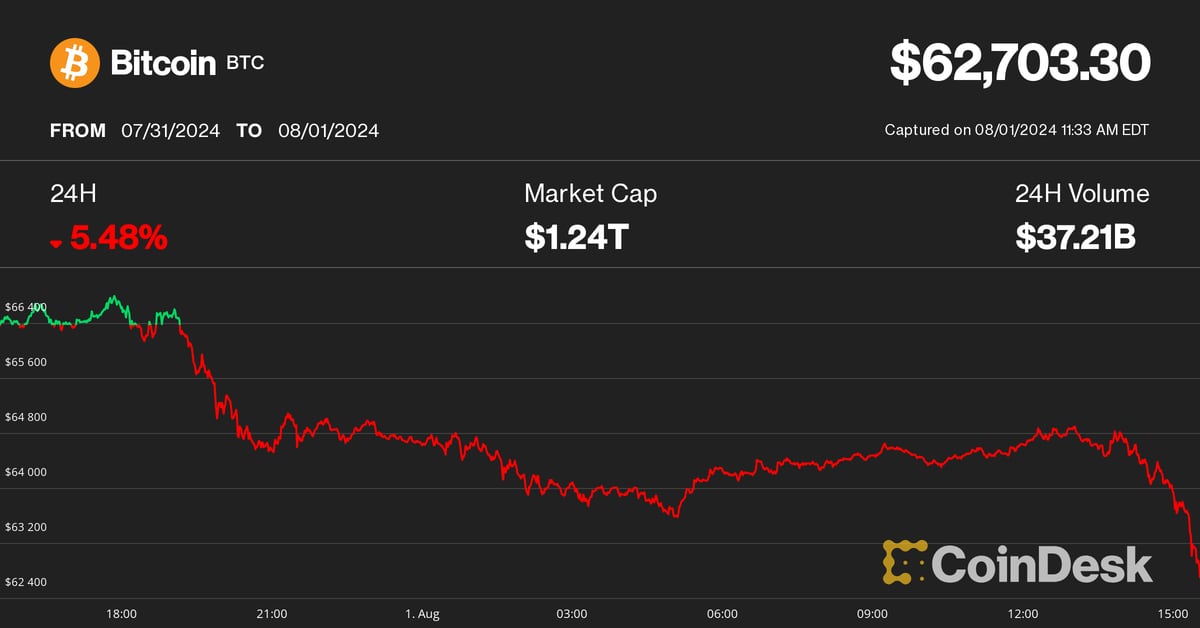Blockchain
Reviewing Blockchain Technology Regulation News Week of May 29, 2

The week of May 19-25 was the most promising for the regulation of blockchain technology in the United States in a very long time. Polsinelli’s Blockchain+ team delayed the publication of this Bi-Weekly update by a week to allow us to cover these exciting updates. These updates include the House of Representatives’ bipartisan approval of the Financial Innovation and Technology for the 21st Century Act (“FIT 21”), Uniswap decentralized finance (“DeFi”) developer responding to Wells notice from the U.S. Securities and Exchange Commission (the “SEC”), and the SEC apparently reversing course on its Ether spot ETF stance. Overnight, it seems like political tides may be turning, with a rising number of administrative and elected officials from across the political spectrum supporting various digital asset proposals.
These developments and a few other brief notes, including claw-back notices sent to many creditors of Voyager Networks, are discussed below.
House and Senate Vote to Overturn Senate Accounting Bulletin 121 (“SAB 121”): May 8-16, 2024
Background: The first crypto-specific bill to reach a full vote in either chamber of Congress passed both chambers with bipartisan support. On May 8th, the House passed Joint Resolution 109 to overturn SAB 121, the controversial guidance from the SEC requiring public companies that custody crypto-assets to treat those assets as liabilities on their balance sheet. With most U.S. banks being public companies required by other regulators to meet asset ratio tests based on their financial statements, this makes it impractical (if not impossible) for most depository banks to take custody of crypto-assets on behalf of customers. The bill was sponsored by Democrat Wiley Nickel (NC) and Republican Mike Flood (NE), with 21 House Democrats voting in favor of the bill despite a White House statement that it intends to veto the bill if it reaches the President’s desk. The bill passed in the Senate a week later, including the approval vote of Democratic Senate Majority Leader Chuck Schumer (NY). While the bill only needed a simple majority to pass, it ended up with a filibuster-proof 60 votes, but less than the two-thirds vote that would be needed to override a Presidential veto.
Analysis: Preventing the safest, most trusted custodial institutions in America from holding digital assets is a step back, rather than a step forward, in consumer protection. It also provides disparate treatment, as banks are not required to account for any other custodial asset as if the bank itself owns the asset. It remains to be seen whether President Biden will make good on his promise to veto or if the SEC will withdraw the rule as requested by Congressman Nickel. While the Presidential veto remains likely, this Congressional support, combined with FDIC Chairman Martin Gruenberg announcing his planned resignation, is a possible sign of the diminution of the influence of certain subsets in the Democratic Party that have been most vocal in their opposition to the digital asset industry.
Uniswap Responds to SEC Wells Notice: May 21, 2024
Background: Uniswap made the fairly unusual decision to publish its response to the SEC’s Wells notice. Wells notices and their responses are generally confidential and are used when the agency’s staff intends to recommend bringing formal charges of securities law violations against the entity under investigation. You can read Uniswap’s blog post announcing the decision to publish its response here. In the response, Uniswap advocates that “[t]he Commission should not take on these significant litigation risks and that bringing this case would encourage Americans to use harder-to-regulate foreign interfaces and trading protocols, while also discouraging future innovators from attempting to foster new ideas that bring much-needed competition and innovation to financial and commercial markets. Although there are legitimate questions about how best to protect customers and market integrity when traders transact on a peer-to-peer basis without an intermediary, those are policy questions that are primarily for Congress and are part of ongoing policy discussions that [Uniswap] Labs has helped lead.”
Analysis: While the Wells notice itself has not been made public, the response gives us a hint to its contents and prior communications between Uniswap and the agency. For instance, the blog post indicates that “[t]he SEC asserts that the Uniswap Protocol is an unregistered securities exchange controlled by Uniswap Labs, that the Uniswap interface is an unregistered securities broker-dealer, and that the UNI token is an investment contract.” While the response comes out swinging, it is unlikely to dissuade the agency from bringing any planned action against Uniswap. Their response, similar to others, appears mostly intended to sway the hearts and minds of legislators and the public rather than the agency officials that the response is addressed to.
House of Representatives Passes FIT 21 Comprehensive Crypto Law: May 22, 2024
Background: The House of Representatives voted overwhelmingly in favor of passing the Financial Innovation and Technology for the 21st Century Act (“FIT 21”). FIT 21 proposes a complete market structure of digital asset regulations, with authority split between the SEC and CFTC. While the bill has changed since we first wrote about it, the general structure has remained remarkably similar. The bill passed 279-136, with 71 Democrats crossing party lines to vote in favor of this Republican-sponsored bill. Notably, support included much of the Democratic House leadership, including the House Minority Whip, Democratic Caucus Chair and Vice Chair, Campaign Committee Chair, and Speaker Emerita Nancy Pelosi. Both the President and SEC Chair, Gary Gensler, denounced the bill, but no veto is presently threatened. Additionally, multiple Democrats, including Yadira Caravei (CO) and Josh Gottheimer (NJ), not only voted for FIT 21, but also argued in favor of it on the House floor debate.
Analysis: This bill’s passage is remarkable for the sheer of number votes and arguments in favor of it from both sides of the aisle. This demonstrates the depth of bipartisan support that the crypto industry is developing, even in this very partisan election year. It is interesting to note that, prior to the vote, House Democratic leaders said that they would not encourage voting against the bill after dozens of Democrats voted to repeal SAB 121, leaving Representative Waters and her allies to rally opposition on their own. The bill still faces a tough route to passage through the Senate.
SEC Approves Ether Spot ETF 19b-4 Applications, Implicitly Acknowledging Ether is Not a Security: May 23, 2024
Background: The SEC has approved various applications for rule changes that, together, will allow exchanges to list spot Ether ETFs (exchange-traded funds that will track the current price of ETFs). While the S-1 applications of the issuing entities have not yet been made effective, and thus the ETFs are not yet actually approved and cannot yet trade, by approving the requested rule change, the SEC has made the determination that spot Ether ETFs can be obtained through Form S-1 applications. Entities whose assets are composed of 40% or more securities may not register through an S-1; rather, they are considered investment companies and must register on Form N-1A or N-2. Until very recently, few people expected these applications to be approved. It appears that something changed internally at the agency, possibly related to the SAB 121 vote, which led the agency to make these changes.
Analysis: It is unclear what made the SEC take an apparent change in stance on the pending spot Ether ETF applications. While not confirmed, it is possible that SEC Commissioner Jaime Lizárraga changed his stance after previously voting to reject the spot Bitcoin ETF and instead indicated that he would not vote to reject the pending Ether Spot ETF 19b-4 applications, leading to a flurry of activity to provide official approvals before the applications lapsed. It may not be coincidental that Commissioner Lizárraga was a top advisor to Congresswoman Nancy Pelosi, who voted in favor of FIT 21. This, combined with a bipartisan push from members of Congress, may have turned a likely rejection into an approval. It is worth noting that none of the applicable Form S-1s on file include Ether staking, meaning these funds will be income-negative as they will need to pay blockchain fees required for trading spot Ether without getting the potential benefit of offsetting staking rewards.
Briefly Noted:
Voyager Network Issues Preference Demands, Unlike FTX: The Unsecured Creditors Committee of Voyager Holdings, a bankruptcy crypto lender, has issued demand letters to many account holders who withdrew funds from their accounts within 90 days prior to their bankruptcy filing. This follows a similar action in the Celsius case. This contrasts with FTX, where preference claims are not applicable since the debtor intends to pay back claims at over 100 percent. Polsinelli is representing a number of claim holders in challenging these preference actions.
Court Rules Craig Wright is Not Inventor of Bitcoin: A U.K. court has ruled that Craig Wright lied “extensively and repeatedly” in both his written and oral evidence over his claims to be the pseudonymous inventor of Bitcoin, Satoshi Nakamoto. The written ruling further stated: “Dr. Wright presents himself as an extremely clever person. However, in my judgment, he is not nearly as clever as he thinks he is.”
Netherlands Court Sentences Privacy Protocol Developer: Tornado.cash developer Alexey Pertsev was sentenced to 64 months in prison for his contributions to the privacy protocol. He faces a long appeal route ahead, which he will need to litigate while imprisoned for writing software.
Individuals Connected to MEV Bot Indicted: Two individuals have been indicted in connection with a hack on an MEV bot. As a reminder, MEV bots essentially front-run transactions to increase the price others buy tokens at and then sell at the increased price. It appears this was an alleged case where the bot operators had others involved in the operation run off with the money. Considering the potential market manipulation implications of the bot itself, it will be interesting to see if the “victims” are also swept up in charges eventually.
SEC Responds in Various Coinbase Lawsuits: The SEC filed its opposition to Coinbase’s request for interlocutory appeal in the case against the exchange and its response to the Coinbase lawsuit over rejected rulemaking in the same week. Those agency attorneys are seemingly busy with even more litigation on the horizon.
SEC Approved Crypto Securities Dealer Soft Launches: Prometheum has soft-launched Ether custody services, treating Ether as a security. It is currently unclear who Prometheum will treat as the issuer and how they will comply with diligence and other obligations with respect to Ether as their offerings expand. This position also appears to be inconsistent with the spot Ether ETF approvals discussed above.
Anti-CBDC Bill Passes in House: The House also passed the CBDC Anti-Surveillance State Act, but this time by a narrow margin on partisan lines. The bill, if passed into law, would prohibit the Federal Reserve from issuing a Central Bank Digital Currency. This is a largely ceremonial bill that has almost no chance of being passed in the Senate and signed into law.
Presidential Candidates Campaign on Crypto Issues: While there is broadening bipartisan support for digital assets as listed above, that may not be as true for the current Presidential Candidates, as former President Trump announced his plan to accept digital asset campaign contributions while President Biden released a campaign advertisement denouncing “cryptocurrency executives and oil barons” as Trump supporters.
Jonathan Schmalfeld Speaks at DC Blockchain Summit: On May 15th, BitBlog author and Polsinelli attorney Jonathan Schmalfeld moderated and provided insight at the D.C. Blockchain Summit during the discussion on branding in the metaverse, including discussions on recent copyright and trademark cases and their implications for industry participants going forward.
Conclusion:
After years of United States regulators failing to work on a comprehensive regulatory scheme pertaining to digital assets and lawmakers making little progress on the kind of bipartisan, systematic legislation needed to allow the industry to prosper in the United States, prospects are looking up.
None of this means that a robust solution is expected in the immediate future, with the SEC still bringing broad enforcement actions against key industry players and without a clear path to get legislation through the Senate in a busy election year. It does, however, seem like a window of opportunity for responsible players within the blockchain industry to proffer legislative solutions that will help crypto and the digital asset industry proliferate in a way that both protects users and investors while allowing for innovation in the always evolving digital economy.
Blockchain
Bitcoin (BTC) Price Crashes as Donald Trump’s Win Odds Dip

Markets received nominally good news on Thursday morning, with the US ISM manufacturing PMI for July falling much more than economists expected, sending interest rates to multi-month lows across the board. Additionally, initial jobless claims in the US jumped to their highest level in about a year. Taken together, the data adds to the sentiment that the US is on the verge of a cycle of monetary easing by the Federal Reserve, which is typically seen as bullish for risk assets, including bitcoin.
Blockchain
Terra Blockchain Reboots After Reentry Attack Leads to $4M Exploit

Please note that our Privacy Policy, terms of use, cookiesAND do not sell my personal information has been updated.
CoinDesk is a awarded press agency that deals with the cryptocurrency sector. Its journalists respect a rigorous set of editorial policiesIn November 2023, CoinDesk has been acquired from the Bullish group, owner of Bullisha regulated digital asset exchange. Bullish Group is majority owned by Block.one; both companies have interests in a variety of blockchain and digital asset businesses and significant digital asset holdings, including bitcoin. CoinDesk operates as an independent subsidiary with an editorial board to protect journalistic independence. CoinDesk employees, including journalists, are eligible to receive options in the Bullish group as part of their compensation.
Blockchain
$6.8M Stolen, ASTRO Collapses 60%

In the latest news in the blockchain industry, there has been a turn of events that has severely affected Terra and its users and investors, with the company losing $6.8 million. The attack, which exploited a reentry vulnerability in the network’s IBC hooks, raises questions about the security measures of the once celebrated blockchain protocol.
A web3 security company, Cyvers Alerts reported that the exploit occurred on July 31st and caused the company to lose 60 million ASTRO, 3.5 million USDC500,000 USDTand 2. 7 BitcoinThe flaw was discovered in April and allows cybercriminals to make payments non-stop by withdrawing money from the network.
Earth’s response
Subsequently, to the hack employed on the Terra blockchain, its official X platform declared the Suspension network operations for a few hours to apply the emergency measure. Finally in its sendTerra’s official account agreed, sharing that its operations are back online: the core transactions that make up the platform are now possible again.
However, the overall value of the various assets lost in the event was unclear.
Market Impact: ASTRO Crashes!
The hack had an immediate impact on the price of ASTRO, which dropped nearly 60% to $0.0206 following the network shutdown. This sharp decline highlights the vulnerability of token prices to security breaches and the resulting market volatility.
This incident is not the first time Terra has faced serious challenges. Earlier this year, the blockchain encountered significant problems that called into question its long-term viability. These repeated incidents underscore the need for stronger security measures to protect users’ assets and maintain trust in the network.
The recent Terra hack serves as a stark reminder of the ongoing security challenges in the blockchain space. As the platform works to regain stability, the broader crypto community will be watching closely.
Read also: Record Cryptocurrency Theft: Over $1 Billion Stolen in 2024
This is a major setback for Terra. How do you think this will impact the blockchain industry?
Blockchain
Luxembourg proposes updates to blockchain laws | Insights and resources

On July 24, 2024, the Ministry of Finance proposed Blockchain Bill IVwhich will provide greater flexibility and legal certainty for issuers using Distributed Ledger Technology (DLT). The bill will update three of Luxembourg’s financial laws, the Law of 6 April 2013 on dematerialised securitiesTHE Law of 5 April 1993 on the financial sector and the Law of 23 December 1998 establishing a financial sector supervisory commissionThis bill includes the additional option of a supervisory agent role and the inclusion of equity securities in dematerialized form.
DLT and Luxembourg
DLT is increasingly used in the financial and fund management sector in Luxembourg, offering numerous benefits and transforming various aspects of the industry.
Here are some examples:
- Digital Bonds: Luxembourg has seen multiple digital bond issuances via DLT. For example, the European Investment Bank has issued bonds that are registered, transferred and stored via DLT processes. These bonds are governed by Luxembourg law and registered on proprietary DLT platforms.
- Fund Administration: DLT can streamline fund administration processes, offering new opportunities and efficiencies for intermediaries, and can do the following:
- Automate capital calls and distributions using smart contracts,
- Simplify audits and ensure reporting accuracy through transparent and immutable transaction records.
- Warranty Management: Luxembourg-based DLT platforms allow clients to swap ownership of baskets of securities between different collateral pools at precise times.
- Tokenization: DLT is used to tokenize various assets, including real estate and luxury goods, by representing them in a tokenized and fractionalized format on the blockchain. This process can improve the liquidity and accessibility of traditionally illiquid assets.
- Tokenization of investment funds: DLT is being explored for the tokenization of investment funds, which can streamline the supply chain, reduce costs, and enable faster transactions. DLT can automate various elements of the supply chain, reducing the need for reconciliations between entities such as custodians, administrators, and investment managers.
- Issuance, settlement and payment platforms:Market participants are developing trusted networks using DLT technology to serve as a single source of shared truth among participants in financial instrument investment ecosystems.
- Legal framework: Luxembourg has adapted its legal framework to accommodate DLT, recognising the validity and enforceability of DLT-based financial instruments. This includes the following:
- Allow the use of DLT for the issuance of dematerialized securities,
- Recognize DLT for the circulation of securities,
- Enabling financial collateral arrangements on DLT financial instruments.
- Regulatory compliance: DLT can improve transparency in fund share ownership and regulatory compliance, providing fund managers with new opportunities for liquidity management and operational efficiency.
- Financial inclusion: By leveraging DLT, Luxembourg aims to promote greater financial inclusion and participation, potentially creating a more diverse and resilient financial system.
- Governance and ethics:The implementation of DLT can promote higher standards of governance and ethics, contributing to a more sustainable and responsible financial sector.
Luxembourg’s approach to DLT in finance and fund management is characterised by a principle of technology neutrality, recognising that innovative processes and technologies can contribute to improving financial services. This is exemplified by its commitment to creating a compatible legal and regulatory framework.
Short story
Luxembourg has already enacted three major blockchain-related laws, often referred to as Blockchain I, II and III.
Blockchain Law I (2019): This law, passed on March 1, 2019, was one of the first in the EU to recognize blockchain as equivalent to traditional transactions. It allowed the use of DLT for account registration, transfer, and materialization of securities.
Blockchain Law II (2021): Enacted on 22 January 2021, this law strengthened the Luxembourg legal framework on dematerialised securities. It recognised the possibility of using secure electronic registration mechanisms to issue such securities and expanded access for all credit institutions and investment firms.
Blockchain Act III (2023): Also known as Bill 8055, this is the most recent law in the blockchain field and was passed on March 14, 2023. This law has integrated the Luxembourg DLT framework in the following way:
- Update of the Act of 5 August 2005 on provisions relating to financial collateral to enable the use of electronic DLT as collateral on financial instruments registered in securities accounts,
- Implementation of EU Regulation 2022/858 on a pilot scheme for DLT-based market infrastructures (DLT Pilot Regulation),
- Redefining the notion of financial instruments in Law of 5 April 1993 on the financial sector and the Law of 30 May 2018 on financial instruments markets to align with the corresponding European regulations, including MiFID.
The Blockchain III Act strengthened the collateral rules for digital assets and aimed to increase legal certainty by allowing securities accounts on DLT to be pledged, while maintaining the efficient system of the 2005 Act on Financial Collateral Arrangements.
With the Blockchain IV bill, Luxembourg will build on the foundations laid by previous Blockchain laws and aims to consolidate Luxembourg’s position as a leading hub for financial innovation in Europe.
Blockchain Bill IV
The key provisions of the Blockchain IV bill include the following:
- Expanded scope: The bill expands the Luxembourg DLT legal framework to include equity securities in addition to debt securities. This expansion will allow the fund industry and transfer agents to use DLT to manage registers of shares and units, as well as to process fund shares.
- New role of the control agent: The bill introduces the role of a control agent as an alternative to the central account custodian for the issuance of dematerialised securities via DLT. This control agent can be an EU investment firm or a credit institution chosen by the issuer. This new role does not replace the current central account custodian, but, like all other roles, it must be notified to the Commission de Surveillance du Secteur Financier (CSSF), which is designated as the competent supervisory authority. The notification must be submitted two months after the control agent starts its activities.
- Responsibilities of the control agent: The control agent will manage the securities issuance account, verify the consistency between the securities issued and those registered on the DLT network, and supervise the chain of custody of the securities at the account holder and investor level.
- Simplified payment processesThe bill allows issuers to meet payment obligations under securities (such as interest, dividends or repayments) as soon as they have paid the relevant amounts to the paying agent, settlement agent or central account custodian.
- Simplified issuance and reconciliationThe bill simplifies the process of issuing, holding and reconciling dematerialized securities through DLT, eliminating the need for a central custodian to have a second level of custody and allowing securities to be credited directly to the accounts of investors or their delegates.
- Smart Contract Integration:The new processes can be executed using smart contracts with the assistance of the control agent, potentially increasing efficiency and reducing intermediation.
These changes are expected to bring several benefits to the Luxembourg financial sector, including:
- Fund Operations: Greater efficiency and reduced costs by leveraging DLT for the issuance and transfer of fund shares.
- Financial transactions: Greater transparency and security.
- Transparency of the regulatory environment: Increased attractiveness and competitiveness of the Luxembourg financial centre through greater legal clarity and flexibility for issuers and investors using DLT.
- Smart Contracts: Potential for automation of contractual terms, reduction of intermediaries and improvement of transaction traceability through smart contracts.
Blockchain Bill IV is part of Luxembourg’s ongoing strategy to develop a strong digital ecosystem as part of its economy and maintain its status as a leading hub for financial innovation. Luxembourg is positioning itself at the forefront of Europe’s growing digital financial landscape by constantly updating its regulatory framework.
Local regulations, such as Luxembourg law, complement European regulations by providing a more specific legal framework, adapted to local specificities. These local laws, together with European initiatives, aim to improve both the use and the security of projects involving new technologies. They help establish clear standards and promote consumer trust, while promoting innovation and ensuring better protection against potential risks associated with these emerging technologies. Check out our latest posts on these topics and, for more information on this law, blockchain technology and the tokenization mechanism, do not hesitate to contact us.
We are available to discuss any project related to digital finance, cryptocurrencies and disruptive technologies.
This informational piece, which may be considered advertising under the ethics rules of some jurisdictions, is provided with the understanding that it does not constitute the rendering of legal or other professional advice by Goodwin or its attorneys. Past results do not guarantee a similar outcome.
-

 Regulation8 months ago
Regulation8 months agoNancy Pelosi Considers Supporting Republican Crypto Bill FIT21 – London Business News
-

 Regulation10 months ago
Regulation10 months agoRipple CTO and Cardano founder clash over XRP’s regulatory challenges ⋆ ZyCrypto
-

 Videos10 months ago
Videos10 months agoCryptocurrency News: Bitcoin, ETH ETF, AI Crypto Rally, AKT, TON & MORE!!
-

 Regulation9 months ago
Regulation9 months agoBitcoin’s future is ‘bleak’ and ripe for regulation, says lead developer
-

 News9 months ago
News9 months agoThe trader earned $46 million with PEPE after reaching a new ATH
-

 News7 months ago
News7 months agoAave Price Increases Following Whales Accumulation and V3.1 Launch
-

 Regulation7 months ago
Regulation7 months agoSouth Korea Imposes New ‘Monitoring’ Fees on Cryptocurrency Exchanges
-

 Regulation7 months ago
Regulation7 months agoA Blank Sheet for Cryptocurrencies: Kamala Harris’ Regulatory Opportunity
-

 Regulation7 months ago
Regulation7 months agoCryptocurrency Regulations in Slovenia 2024
-

 Regulation9 months ago
Regulation9 months ago🔒 Crypto needs regulation to thrive: Tyler Cowen
-

 Blockchain9 months ago
Blockchain9 months agoSolana ranks the fastest blockchain in the world, surpassing Ethereum, Polygon ⋆ ZyCrypto
-

 Blockchain9 months ago
Blockchain9 months agoSolana Surpasses Ethereum and Polygon as the Fastest Blockchain ⋆ ZyCrypto





